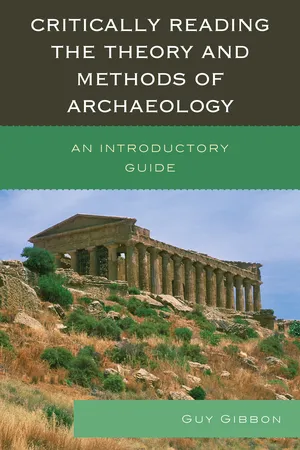
eBook - ePub
Critically Reading the Theory and Methods of Archaeology
An Introductory Guide
- English
- ePUB (mobile friendly)
- Available on iOS & Android
eBook - ePub
About this book
Critically Reading the Theory and Methods of Archaeology stands out as the most thorough and practical guide to the essential critical reading and writing skills that all students, instructors, and practitioners should have.It provides priceless insight for the here and now of the Theory and Methods of Archaeology classes and for a lifetime of reading, learning, teaching, and writing. Chapters focus on rigorous reasoning skills, types of argument, the main research orientations in archaeology, the basic procedural framework that underlies all schools of archaeology, and issues in archaeology raised by skeptical postmodernists.
Frequently asked questions
Yes, you can cancel anytime from the Subscription tab in your account settings on the Perlego website. Your subscription will stay active until the end of your current billing period. Learn how to cancel your subscription.
No, books cannot be downloaded as external files, such as PDFs, for use outside of Perlego. However, you can download books within the Perlego app for offline reading on mobile or tablet. Learn more here.
Perlego offers two plans: Essential and Complete
- Essential is ideal for learners and professionals who enjoy exploring a wide range of subjects. Access the Essential Library with 800,000+ trusted titles and best-sellers across business, personal growth, and the humanities. Includes unlimited reading time and Standard Read Aloud voice.
- Complete: Perfect for advanced learners and researchers needing full, unrestricted access. Unlock 1.4M+ books across hundreds of subjects, including academic and specialized titles. The Complete Plan also includes advanced features like Premium Read Aloud and Research Assistant.
We are an online textbook subscription service, where you can get access to an entire online library for less than the price of a single book per month. With over 1 million books across 1000+ topics, we’ve got you covered! Learn more here.
Look out for the read-aloud symbol on your next book to see if you can listen to it. The read-aloud tool reads text aloud for you, highlighting the text as it is being read. You can pause it, speed it up and slow it down. Learn more here.
Yes! You can use the Perlego app on both iOS or Android devices to read anytime, anywhere — even offline. Perfect for commutes or when you’re on the go.
Please note we cannot support devices running on iOS 13 and Android 7 or earlier. Learn more about using the app.
Please note we cannot support devices running on iOS 13 and Android 7 or earlier. Learn more about using the app.
Yes, you can access Critically Reading the Theory and Methods of Archaeology by Guy Gibbon in PDF and/or ePUB format, as well as other popular books in Social Sciences & Archaeology. We have over one million books available in our catalogue for you to explore.
Information
Table of contents
- Contents
- Introduction
- Part I: Foundations
- Chapter 1: What Kind of Archaeology Is It?
- Chapter 2: What Kind of Investigation Is It?
- Chapter 3: What Are the Issue and the Claim?
- Chapter 4: What Is the Argument?
- Chapter 5: What Are the Assumptions?
- Chapter 6: Is the Writing Clear?
- Chapter 7: Are (Deceptive) Rhetorical Devices Used?
- Chapter 8: Is There a Fallacy in the Reasoning?
- Chapter 9: Are There Skeptical Postmodern Themes in the Argument?
- Part II: From Observations to Population Estimates
- Chapter 10: Are Facts Clearly Distinguished from Opinions and Other Claims?
- Chapter 11: How Are the Observations Summarized?
- Chapter 12: Is There an Inductive Argument?
- Chapter 13: Is There a Population Estimate from a Sample?
- Part III: Interpreting the Archaeological Record
- Chapter 14: Is There a Theory in My Reading?
- Chapter 15: Which Research Program Is My Reading an Example Of?
- Chapter 16: Is an Explanation Offered?
- Chapter 17: Is There a Causal Argument?
- Part IV: Evaluating Interpretations of the Archaeological Record
- Chapter 18: Are Deductively Valid Conclusions Drawn?
- Chapter 19: Are Concepts Given Archaeological Interpretations?
- Chapter 20: Are the Conclusions Reasonable?
- Coda: Is Critical Reading Worth the Effort?
- Notes
- Bibliography
- About the Author